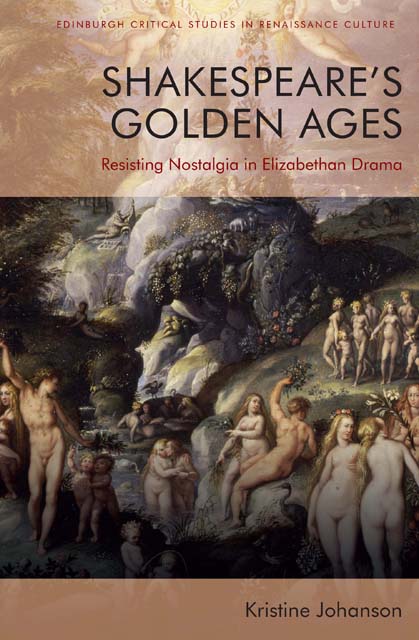Book contents
- Frontmatter
- Contents
- Dedication
- Series Editors’ Preface
- Prologue
- Note on Citation
- Introduction: Rethinking Nostalgia
- 1 Against Nostalgia: Looking Forward to the Future in the Queen’s Men’s Plays and Marlowe’s Tamburlaine
- 2 What Merry World in England? Nostalgic Paroemia and The Second Part of Henry VI
- 3 In the Mean Season: Richard II’s Absent Hospitality
- 4 The Lessons of Nostalgia in Julius Caesar and Sejanus
- Conclusion: Resisting Nostalgia
- Bibliography
- Index
Prologue
Published online by Cambridge University Press: 18 November 2022
- Frontmatter
- Contents
- Dedication
- Series Editors’ Preface
- Prologue
- Note on Citation
- Introduction: Rethinking Nostalgia
- 1 Against Nostalgia: Looking Forward to the Future in the Queen’s Men’s Plays and Marlowe’s Tamburlaine
- 2 What Merry World in England? Nostalgic Paroemia and The Second Part of Henry VI
- 3 In the Mean Season: Richard II’s Absent Hospitality
- 4 The Lessons of Nostalgia in Julius Caesar and Sejanus
- Conclusion: Resisting Nostalgia
- Bibliography
- Index
Summary
‘Are you homesick?’ a witty colleague asked me years ago, as I summarised my PhD project on nostalgia and rhetoric at an annual Shakespeare Association of America conference. Not only did his question reference nostalgia's origins in Heimweh, the disease of homesickness; it also asked me, an American studying in Scotland, if my research was driven by my own subconscious concerns. I said no. Perhaps my ego lied: who wants to be nostalgic? In contemporary usage, to be nostalgic is to be banal, unimaginative, conservative in policy and politics, retrograde in one's desires (to long to be in Denmark rather than Wittenberg). It is to commodify history, to be open to the commercial exploitation of your memory and the seemingly inevitable longing attached to objects from one's youth. To be nostalgic is to be lured by the aesthetics and moments of cultural recognition manufactured by Mad Men and Stranger Things. But as I argue below, such aesthetic manipulation of personal desires is just one way to understand the elusive shape-shifter that is nostalgia.
This book examines William Shakespeare's use of nostalgia as a political rhetoric that is contingent not strictly on a desire for the past, but on a longing for the future. From the perspective of 2022, such future-oriented nostalgia may no longer seem extraordinary. The COVID-19 pandemic created a rupture in real time and, consequently, longings for pre- and post-virus life as well as an eventual ‘lockdown nostalgia’ in those countries beginning to ease restrictions. In 2016, political campaigns across the United States and Europe in particular demonstrated just how potent the idealised past could be as a convinc-ing blueprint for the imagined future. Donald Trump's enduring and successful reprise of Ronald Reagan's 1980 ‘Let's Make America Great Again’; Brexit Leave campaigners’ discourse of Britain's past glories as reclaimable only by leaving the EU; Geert Wilders's use of the iconography of seventeenth-century admiral Michiel de Ruyter to demand ‘Nederland terugveroveren’, ‘Reconquer the Netherlands’. The success of these politicians and campaigns exemplified after the fact the power of such rhetoric.
The origins of Shakespeare's Golden Ages predate these developments, but as I argue it is precisely the suasive force of nostalgia that Shakespeare stages by coupling it to moments of historical crisis which depend on a future vision for their success.
- Type
- Chapter
- Information
- Shakespeare’s Golden AgesResisting Nostalgia in Elizabethan Drama, pp. x - xiiiPublisher: Edinburgh University PressPrint publication year: 2022

